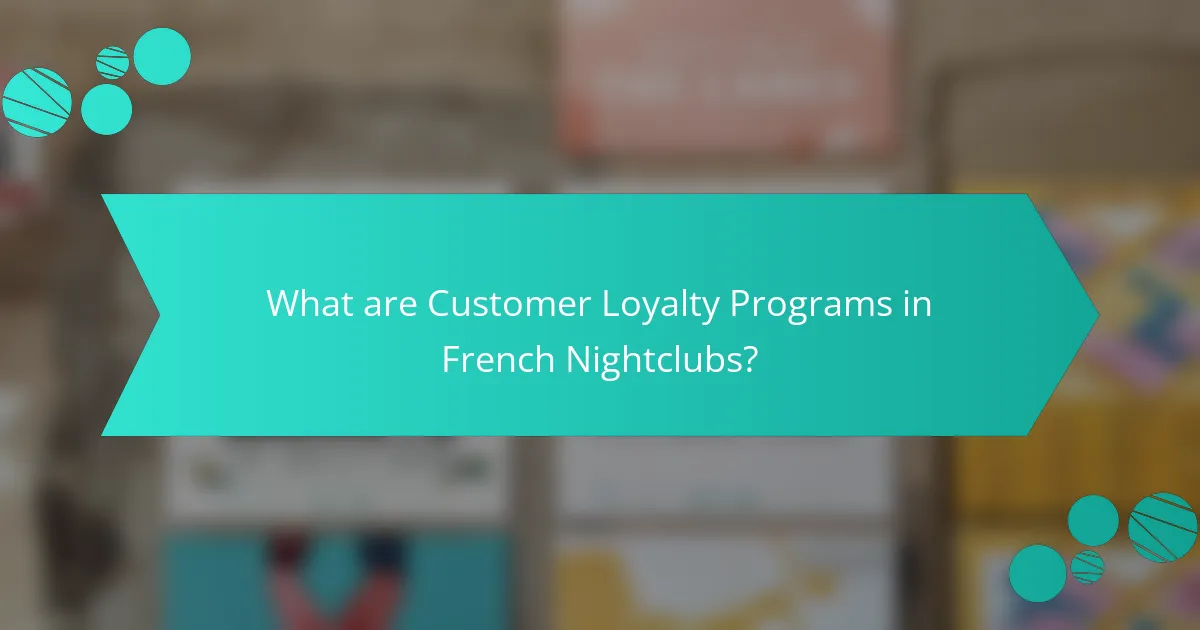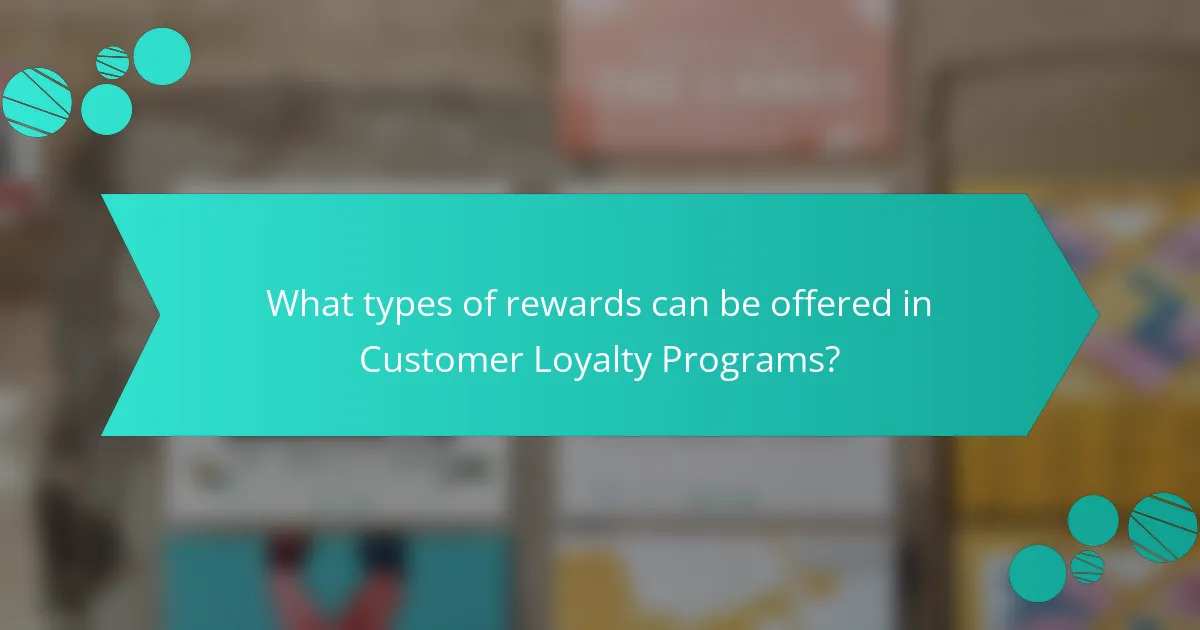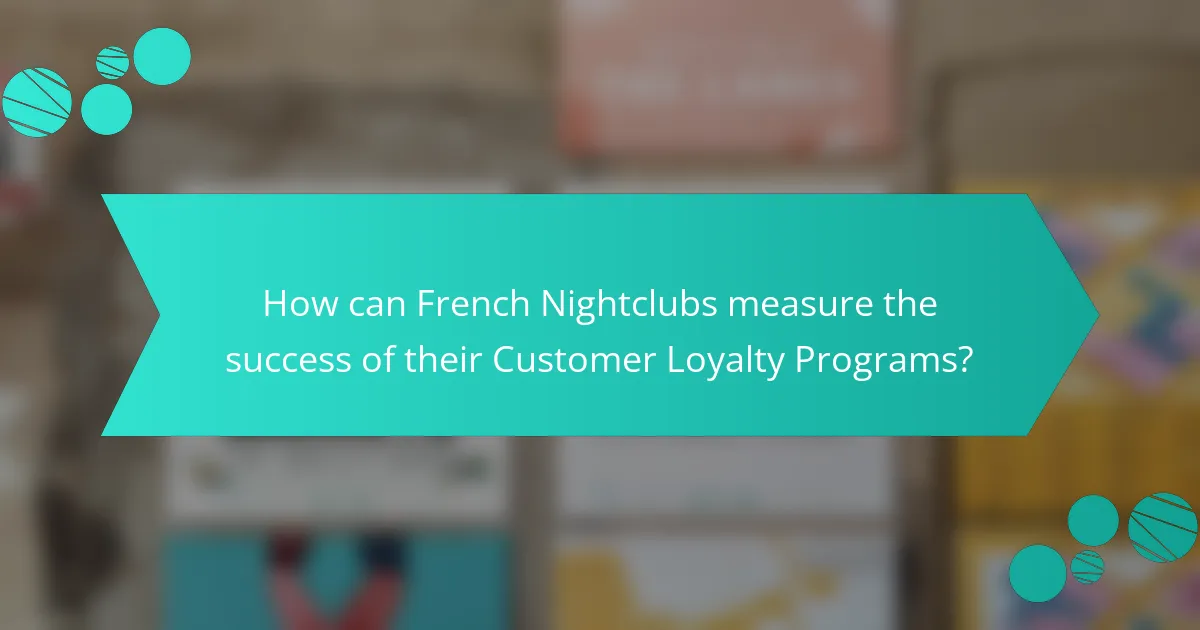Customer loyalty programs in French nightclubs are initiatives aimed at fostering repeat patronage through various rewards such as discounts, exclusive access, and special promotions. These programs enhance customer engagement and build long-term relationships, allowing nightclubs to stand out in a competitive market. Common strategies include points systems for redeeming rewards and tiered benefits based on customer spending levels. The effectiveness of these loyalty programs can be measured through metrics such as customer retention rates, visit frequency, average spend per visit, and customer feedback. By analyzing these factors, nightclubs can assess the impact of their loyalty initiatives on customer satisfaction and overall brand perception.

What are Customer Loyalty Programs in French Nightclubs?
Customer loyalty programs in French nightclubs are initiatives designed to encourage repeat patronage. These programs typically offer rewards such as discounts, exclusive access, or special promotions to loyal customers. They aim to enhance customer engagement and build long-term relationships. Many nightclubs implement these programs to differentiate themselves in a competitive market. For instance, a nightclub may provide a points system where customers earn points for each visit or purchase. Accumulated points can then be redeemed for free drinks or entry fees. According to industry studies, effective loyalty programs increase customer retention rates significantly. This demonstrates that loyalty programs are a strategic tool for enhancing customer experiences in French nightlife.
How do Customer Loyalty Programs function in the nightlife industry?
Customer loyalty programs in the nightlife industry incentivize repeat patronage. They typically offer rewards such as discounts, exclusive access, or free items. These programs collect customer data to tailor promotions and enhance engagement. Nightclubs often utilize mobile apps or membership cards for easy tracking of points. Members may receive personalized offers based on their spending habits. Research indicates that loyalty programs can increase customer retention by 5% to 10%. This retention can lead to a significant increase in profits, with studies showing a potential 25% to 95% increase in profits from loyal customers.
What key elements are essential for a successful loyalty program?
A successful loyalty program includes clear rewards, customer engagement, and data tracking. Clear rewards motivate customers to participate. Engaging customers through personalized communication enhances their experience. Data tracking allows for the analysis of customer behavior. This analysis helps in tailoring offers to meet customer preferences. A study by Loyalty360 found that programs with personalized rewards see a 20% increase in customer retention. Furthermore, consistent communication about rewards keeps customers informed and engaged. These elements collectively drive loyalty and increase overall customer satisfaction.
How do these elements enhance customer experience?
Customer loyalty programs enhance customer experience by providing tailored rewards and incentives. These programs foster a sense of belonging among patrons. They encourage repeat visits by offering exclusive discounts and perks. Personalization in rewards leads to increased satisfaction and engagement. Customers feel valued when their preferences are recognized. This emotional connection enhances their overall experience. Additionally, loyalty programs can create community among club-goers. Engaged customers are more likely to recommend the nightclub to others. This word-of-mouth promotion further improves the club’s reputation and attracts new clientele.
What are the primary benefits of Customer Loyalty Programs for French Nightclubs?
Customer loyalty programs for French nightclubs primarily enhance customer retention and increase revenue. These programs incentivize repeat visits through rewards and discounts. They foster a sense of belonging among patrons. Nightclubs can gather valuable customer data through these programs. This data helps in personalizing marketing efforts. Studies show that loyal customers spend more, often up to 67% more than new customers. Additionally, loyalty programs can differentiate a nightclub in a competitive market. This differentiation can lead to increased word-of-mouth referrals.
How do these programs increase customer retention?
Customer loyalty programs increase customer retention by offering rewards that incentivize repeat visits. These programs create a sense of belonging among patrons. They often provide exclusive benefits such as discounts, special events, or early access to tickets. This encourages customers to return for the perks. Additionally, loyalty programs enhance customer engagement through personalized communication. Regular updates about rewards keep customers informed and motivated. According to a study by the Harvard Business Review, increasing customer retention rates by just 5% can lead to a 25% to 95% increase in profits. Hence, the structure and rewards of loyalty programs effectively drive customer loyalty and retention.
What financial advantages do nightclubs gain from loyalty programs?
Nightclubs gain several financial advantages from loyalty programs. These programs increase customer retention, leading to higher repeat visits. Loyal customers tend to spend more per visit compared to new patrons. According to a study by Bain & Company, increasing customer retention by just 5% can boost profits by 25% to 95%. Loyalty programs also provide valuable data on customer preferences. This data enables targeted marketing and personalized offers, enhancing overall sales. Additionally, loyalty programs can reduce marketing costs by fostering word-of-mouth referrals. Overall, these financial benefits contribute to a nightclub’s sustained profitability and competitive edge.

What types of rewards can be offered in Customer Loyalty Programs?
Customer loyalty programs can offer various types of rewards to enhance customer engagement. Common rewards include discounts on future purchases, which incentivize repeat business. Points systems are also popular, where customers earn points for each purchase that can be redeemed for rewards. Exclusive access to events or promotions is another reward type that fosters a sense of belonging. Free products or services can be offered as rewards, encouraging customers to return. Additionally, tiered rewards systems can provide enhanced benefits as customers reach higher spending levels. These strategies are designed to increase customer retention and satisfaction within the nightlife industry.
How do different reward structures influence customer engagement?
Different reward structures significantly influence customer engagement by shaping the motivations and behaviors of customers. For example, tiered reward systems encourage frequent visits by offering escalating benefits. Customers feel more valued as they progress through tiers, enhancing their loyalty to the brand.
Point-based systems provide immediate gratification, motivating customers to engage more frequently to accumulate points. Research shows that 70% of consumers are more likely to engage with brands offering instant rewards.
Additionally, experiential rewards, such as exclusive access to events, foster deeper emotional connections. Customers are drawn to unique experiences that enhance their social status or enjoyment.
In French nightclubs, these tailored reward structures can lead to increased patronage and word-of-mouth promotion. Engaged customers are likely to share their experiences, amplifying the nightclub’s reach and appeal.
What are the most popular rewards among nightclub patrons?
The most popular rewards among nightclub patrons include free drinks, exclusive access to events, and discounts on entry fees. Free drinks are highly valued as they enhance the overall experience. Exclusive access to special events creates a sense of privilege and belonging. Discounts on entry fees encourage repeat visits and increase customer loyalty. Additionally, VIP table reservations and personalized service are also sought-after rewards. These rewards contribute to a more enjoyable and memorable nightlife experience. Studies show that loyalty programs offering these rewards can significantly increase patron retention and satisfaction.
How can nightclubs tailor rewards to their specific audience?
Nightclubs can tailor rewards to their specific audience by analyzing customer preferences and behaviors. They can use data from loyalty programs to identify popular drinks, music genres, and event types. Personalizing rewards such as drink discounts or exclusive access to events can enhance customer satisfaction. Additionally, implementing tiered rewards based on spending can incentivize higher spending among loyal patrons. Nightclubs can also gather feedback through surveys to refine their offerings. Collaborating with local influencers can attract a targeted demographic and enhance engagement. These strategies can lead to increased customer retention and loyalty.
What strategies can be implemented to enhance customer engagement?
Implementing personalized communication strategies enhances customer engagement. Tailoring messages to individual preferences increases relevance. Utilizing data analytics helps identify customer behavior patterns. Offering exclusive rewards for loyalty fosters a sense of belonging. Creating interactive experiences encourages participation and feedback. Hosting events that resonate with customer interests boosts attendance and interaction. Regularly updating loyalty program benefits keeps customers informed and excited. According to a study by Accenture, 91% of consumers are more likely to shop with brands that provide relevant offers and recommendations.
How can personalized communication improve loyalty program effectiveness?
Personalized communication can significantly enhance the effectiveness of loyalty programs. It fosters a deeper emotional connection between customers and the brand. Tailored messages resonate more with individuals, making them feel valued. This approach increases customer engagement and retention rates. According to a study by Accenture, 91% of consumers are more likely to shop with brands that provide relevant offers and recommendations. Personalized communication can also lead to higher redemption rates for rewards. Customers are more likely to participate in a program that acknowledges their preferences and behaviors. This targeted strategy ultimately drives increased sales and customer loyalty.
What role does social media play in promoting loyalty programs?
Social media plays a crucial role in promoting loyalty programs. It enhances visibility and engagement for these programs. Platforms like Facebook and Instagram allow nightclubs to share updates and promotions directly with their audience. This direct communication fosters a sense of community among patrons. Additionally, social media facilitates user-generated content, where customers share their experiences. This organic promotion can significantly increase interest in loyalty programs. According to a study by Sprout Social, 79% of consumers are more likely to engage with brands that have a strong social media presence. Thus, social media effectively amplifies the reach and appeal of loyalty programs in French nightclubs.

How can French Nightclubs measure the success of their Customer Loyalty Programs?
French nightclubs can measure the success of their customer loyalty programs through several key metrics. One primary method is tracking customer retention rates. This indicates how many customers return to the nightclub after joining the loyalty program.
Another important metric is the increase in frequency of visits by loyalty program members. Nightclubs can compare the average number of visits per month before and after customers enroll in the program.
Additionally, analyzing the average spend per visit helps assess the program’s effectiveness. If loyalty members spend more than non-members, it reflects the program’s success in driving revenue.
Surveys and feedback from loyalty program participants also provide valuable insights. Nightclubs can gauge customer satisfaction and identify areas for improvement.
Finally, monitoring social media engagement and online reviews can indicate the program’s impact on brand perception. Positive feedback often correlates with successful loyalty initiatives.
By combining these metrics, French nightclubs can effectively evaluate the performance of their customer loyalty programs.
What key performance indicators should be tracked?
Key performance indicators (KPIs) that should be tracked for customer loyalty programs in French nightclubs include customer retention rate, frequency of visits, average spend per visit, and customer satisfaction scores. Customer retention rate measures the percentage of repeat customers over a specific period. Frequency of visits indicates how often customers return to the nightclub. Average spend per visit reflects the revenue generated per customer visit. Customer satisfaction scores assess the overall experience and satisfaction levels of patrons. Tracking these KPIs helps nightclub owners understand the effectiveness of their loyalty programs and make informed decisions to enhance customer engagement.
How can customer feedback be utilized for program improvement?
Customer feedback can be utilized for program improvement by systematically collecting and analyzing responses. This process identifies strengths and weaknesses in the loyalty program. For instance, surveys can reveal customer satisfaction levels and areas needing enhancement. Feedback can inform adjustments to rewards, ensuring they align with customer preferences. Additionally, direct comments can highlight specific pain points, allowing for targeted solutions. Implementing changes based on feedback can increase customer retention and satisfaction. Studies show that businesses that actively use customer feedback can improve their service quality by up to 30%.
What best practices should be followed when designing a loyalty program?
Designing a loyalty program requires clear objectives and customer understanding. Establish goals that align with business needs, such as increasing retention or boosting sales. Segment customers to tailor rewards effectively. Offer tiered rewards to incentivize higher spending and engagement. Ensure the program is easy to understand and join. Use data analytics to track performance and adjust strategies. Incorporate feedback mechanisms to improve the program continuously. Successful programs, like Starbucks Rewards, show significant increases in customer engagement and sales.
How can nightclubs ensure inclusivity in their loyalty offerings?
Nightclubs can ensure inclusivity in their loyalty offerings by creating programs that cater to diverse customer needs. This includes offering various reward options that appeal to different demographics. Nightclubs should consider accessibility features in their physical spaces and marketing materials. They can also implement tiered loyalty programs that recognize and reward different levels of engagement. Surveys and feedback mechanisms can help gather insights from a wide range of customers. Additionally, partnerships with local community organizations can enhance outreach and participation. According to a 2020 survey by Eventbrite, 62% of attendees prefer venues that promote inclusivity. This data supports the need for inclusive loyalty offerings in nightclubs.
What common pitfalls should be avoided in loyalty program implementation?
Common pitfalls in loyalty program implementation include lack of clear goals, insufficient customer research, and complicated reward structures. Without clear goals, programs may fail to align with business objectives. Insufficient customer research can lead to misunderstandings of customer preferences. Complicated reward structures may confuse customers, reducing program participation. Additionally, neglecting to promote the program can result in low awareness and engagement. Failing to track performance metrics can hinder the ability to make necessary adjustments. Finally, overlooking customer feedback can prevent improvements that enhance the program’s effectiveness. These pitfalls can undermine the success of loyalty programs in French nightclubs.
What tips can help maximize the effectiveness of Customer Loyalty Programs?
To maximize the effectiveness of Customer Loyalty Programs, implement personalized rewards. Tailored offers increase engagement and satisfaction. Regularly analyze customer data to understand preferences. Use this information to refine the program. Promote exclusivity by offering unique rewards that cannot be found elsewhere. This approach enhances perceived value. Encourage social sharing by integrating referral bonuses. Customers are motivated to share their experiences with friends. Regular communication is essential to keep members informed. Send updates about new rewards and special promotions. Finally, track program performance using key metrics. This allows for continuous improvement and adaptation to customer needs.
Customer loyalty programs in French nightclubs are strategic initiatives aimed at encouraging repeat patronage through rewards such as discounts, exclusive access, and special promotions. These programs enhance customer engagement and foster long-term relationships, ultimately leading to increased retention rates and profitability. Key elements for success include personalized rewards, effective communication, and data tracking, which collectively improve customer experiences and satisfaction. The article delves into the various types of rewards, their impact on engagement, and best practices for designing inclusive and effective loyalty programs in the nightlife industry.